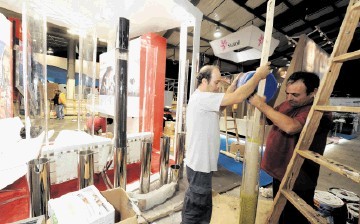
Opportunities for developing heavy oil in the North Sea are significant, an expert said last night, ahead of an industry conference in Aberdeen.
The World Heavy Oil Congress is being attended by about 1,000 delegates from all over the world.
Heavy oil is more difficult to produce because of its thick, sticky consistency.
Bob Ruddiman, head of energy and natural resources at law firm Pinsent Masons and one of today’s speakers, believes its time has come in the North Sea. He said: “The opportunity is significant. There are proven and discovered significant reserves.
“As we look at what I would call the second half of the UK continental shelf (UKCS) and start to really focus on maximising the resources and recovery, I think this is the time for heavy oil.”
But the congress, which launched last night with a dinner and reception, has attracted criticism from environmental group Friends of the Earth (FoE).
It hit out at Aberdeen City and shire councils, oil firms Shell and Suncor and service firm Halliburton for supporting the event, because of its links with oil or tar sands – a type of heavy oil deposit prevalent in Alberta, Canada.
FoE claims the extraction of oil sands has meant the destruction of “swathes” of forest.
Congress visitors include a large delegation from heavy-oil-rich Alberta, including international and intergovernmental relations minister Cal Dallas. Mr Dallas told the Press and Journal that the amount of land affected was less than claimed and that Alberta’s government was very open about the industry.
He said Alberta had a huge opportunity, with 170billion barrels of proven reserve oil sands, accounting for more than 95% of the state’s proven reserves.
Alberta, about the size of France but with a population of just 3.7million, has a development pipeline worth an estimated £200billion.
Mr Dallas said: “We want to raise awareness of our commitment to sustainable responsible development and the opportunities that there are for companies globally.”
The congress is being held at Aberdeen Exhibition and Conference Centre (AECC) today, tomorrow and Thursday.
Mr Ruddiman said: “Heavy oil is a very broad subject and for any broad subject you are going to find extremes, you are going to have opponents and supporters.
“As stakeholders in the drive for energy, we need to look at heavy oil against an assumption of good environmental practice, good safe operations, proper regulation and then within that framework push out the technology and know-how so that we can extract the heavy oil – but we must not do it at any price.
“Over the past six to seven years the more balanced energy experts have been talking about a mix of energy resources rather than saying it should all be nuclear, wind or hydropower.
“There is no doubt heavy oil has a role to play but it needs to be done in a way that has no cost to the environment, be that physical or sociopolitical.
“From the Aberdeen point of view, there is an obvious push in technology for extracting and flowing oil.
“It is a strong play and it is going to challenge engineering in the design and construction of facilities onshore and offshore.
“I don’t see it doing anything other than developing further, but it is going to present challenges.”